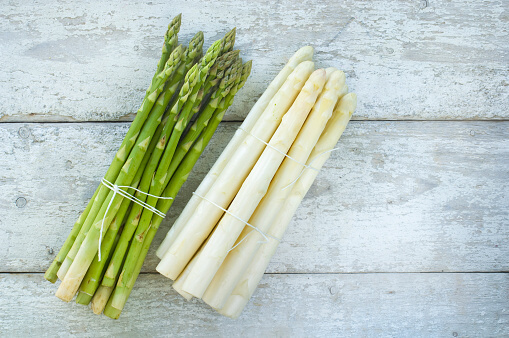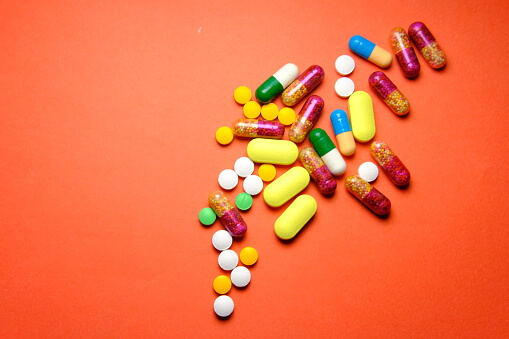Why Asparagus is an A-List Food
7 years ago | Nutrition
By Joy Stephenson-Laws, JD, Founder
It’s spring time, and asparagus is now in season. You are likely most familiar with green asparagus, but this delicious, crunchy veggie also comes in purple and white. And there are up to 300 species of asparagus around the world.
The word “asparagus” is derived from a Greek word meaning “sprout” or “shoot.” Asparagus used to be classified as being a plant belonging to the lily family, Liliaceae. However, not too long ago, asparagus was given its own plant name, Asparagus officinalis.
Pretty much all of the U.S. commercial production of asparagus comes from California, Washington and Michigan. And this veggie has been cultivated for thousands of years. Reportedly, in ancient medicine asparagus was used for a variety of ailments, including toothaches and kidney problems.
“In ancient times, asparagus was renowned as an aphrodisiac, and maybe for good reason. This succulent, savory vegetable contains a stimulating blend of nutrients that help boost energy, cleanse the urinary tract and neutralize excess ammonia, which can cause fatigue and sexual disinterest,” according to one report.
“They [asparagus plants] possess a variety of biological properties, such as being antioxidants, immunostimulants, anti-inflammatory, antihepatotoxic [helping prevent damage to the liver], antibacterial, antioxytocic [countering uterine contractions and delaying childbirth], and reproductive agents,” reports the National Institutes of Health (NIH).
Foods with these types of properties may help prevent a myriad of diseases, including cancer, heart disease, diabetes and more.
Not only is asparagus cholesterol-free and low-calorie, but also part of what makes asparagus so good for you is that it is rich in an amino acid called asparagine (this amino acid is also the reason why asparagus makes your pee smell!).
Asparagine is important for the development and function of the brain. It actually plays a role in the metabolic control of cell functions in nerve and brain tissue.
The amino acid asparagine is also a natural diuretic. In addition to this, just two cups of asparagus contains nearly 334 grams of water, making it a very hydrating vegetable and adds to its strong diuretic properties.
It has been reported that Dioscorides, a first century Greek physician, recommended extracts of asparagus root for treatment of urinary and kidney problems, jaundice and sciatica.
“Ancient Grecians and Romans used Asparagus for its diuretic properties. It helps flush out the kidneys and help in the prevention of the formation of kidney stones,” reports the National Institutes of Health (NIH).
“Asparagus acts to increase cellular activity in the kidneys and thus increases the rate of urine production.”
Asparagus may also help prevent cystitis (urinary tract infections). And an added bonus is it might also beat belly bloat and constipation.
If you are looking to slim down for summer or need to lose a few pounds for health-related matters, asparagus is something you may want to strongly consider putting on your plate.
Along with being low-calorie and cholesterol-free, two cups of cooked asparagus contains nearly nine grams of protein. Just goes to show you, you do not have to always get your intake of protein from animal foods.
Asparagus is also a great source of both soluble and insoluble fiber. Soluble fiber dissolves in water and swells like a sponge in the stomach, giving food a jellylike bulk. It combines with fat in the intestines and pulls it out of the body before it can enter the bloodstream. It is soluble fiber that may help lower blood cholesterol, slow the absorption of carbohydrates from foods and help stabilize blood sugar levels.
Insoluble fiber does not blend with water but adds bulk to the stool, helping prevent constipation.
Other reasons why you may want to eat more asparagus, includes the fact that this veggie is also rich in B vitamins (particularly vitamins B6 and B9 (folate)). B vitamins help regulate an amino acid called homocysteine. Too much of this amino acid may increase your risk for heart disease and more.
“A high homocysteine level is not something you want to have,” according to Harvard Health. “...elevated levels have been linked to dementia, heart disease, stroke, and osteoporosis. The good news: Homocysteine can be lowered easily and inexpensively with a trio of B vitamins — B6, B12, and folic acid.”
Asparagus is also rich in a powerful antioxidant called glutathione. This antioxidant has numerous potential health benefits including boosting the immune system, reducing inflammation and helping maintain liver health. It also has strong anti-aging properties.
Glutathione is “a detoxifying compound that can help destroy carcinogens. For this reason, asparagus may help fight or protect against certain cancers, including bone, breast, lung and colon cancers,” according to this report.
Now let’s look at some of the nutrients in just two cups of cooked (boiled) asparagus:
- Calcium, 83 mg. Of course, calcium is important for building and maintaining strong bones and teeth. This mineral is also important for maintaining hair and nail health in perimenopausal and menopausal women. Adequate calcium intake may also decrease your risk for colorectal cancer.
- Magnesium, 50 mg. This mineral helps regulate blood pressure, contributes to bone metabolism and has antioxidant functions. Magnesium is also great for pain management. Many people use magnesium as a safe alternative to ibuprofen or acetaminophen. Magnesium may even help alleviate leg cramps women may experience during pregnancy.
- Phosphorus, 194 mg. This mineral often does not get the credit it deserves, but it does so much for your body. Phosphorus is almost as abundant in your body as calcium and helps calcium build strong bones and teeth. Phosphorus is also important for how your body stores and uses energy, repairs cells and is needed to make proteins like the one responsible for the oxygen-carrying capabilities of our red blood cells. This mineral has also been linked to weight management. In a study of almost 40,000 women in Korea, phosphorus deficiency correlated with weight gain from oral contraceptives. Furthermore, a study from Lebanon showed that phosphorus supplements in a small group (63 people) for 12 weeks significantly decreased body weight, BMI, waist circumference and subjective appetite scores.
- Potassium, 806 mg. Potassium may help lower blood pressure by balancing out negative effects of salt. According to Harvard Health, “[w]hen it comes to fighting high blood pressure, the average American diet delivers too much sodium and too little potassium. Eating to reverse this imbalance could prevent or control high blood pressure and translate into fewer heart attacks, strokes, and deaths from heart disease.”
- Sodium, 50 mg. This often feared mineral is something we may have been told to avoid, but in reality sodium helps to engineer the actions of every human cell. Every human action including eating, thinking, running and working depends on adequate balance of sodium. Just be careful and talk to your doctor about your particular sodium needs. Avoid processed foods, which usually contain way more sodium than any of us may need. Asparagus provides a healthier, more natural way to get sodium.
- Vitamin C, 27.7 mg. You likely know about the immune-boosting benefits of vitamin C, but what about this nutrient’s importance regarding aging? Read here to find out.
- Choline, 94 mcg. According to Oregon State University, [a]nimal studies have shown that choline is essential for optimal brain development and influences cognitive function in later life.” Choline is also important for liver function, normal brain development, liver function, nerve function and muscle movement.
- Vitamin A, 3622 IU. Vitamin A helps with bone growth and reproductive health. It is mainly known for improving your eyesight, skin health and cell regeneration.
- Lycopene, 108 mcg. Lycopene is an anti-inflammatory compound. According to the National Institutes of Health (NIH), an underlying cause of diseases, including cardiovascular disease, diabetes and cancer, is chronic inflammation. “Lycopene has been shown to have anticancer activity against breast cancers by a variety of mechanisms and with varied potency depending on the genetic mutations of the cancer,” reports NIH. “Dietary lycopene has been associated with decreased risk of death from prostate cancer.”
- Lutein + zeaxanthin, 2776 mcg. These are two carotenoids and antioxidants that concentrate in eye tissue. According to the American Optometric Association, “[l]utein and zeaxanthin filter harmful high-energy blue wavelengths of light and help protect and maintain healthy cells in the eyes. Of the 600 carotenoids found in nature, only these two are deposited in high quantities in the retina (macula) of the eye.”
- Vitamin K, 182.2 mcg. This vitamin is critical for proper blood clotting and bone metabolism. It may also help maintain brain function, a healthy metabolism and may even help prevent cancer.
Ways to eat and prepare asparagus?
Do not overcook asparagus! Cooking asparagus helps release its cancer-fighting properties, but overcooking it will deplete much of the nutritional value.
Lightly grill, roast or sautee so you preserve the crunchy texture and nutrients. Briefly blanching is a great way to preserve nutritional value as well.
Asparagus makes a great side dish, seasoned with a bit of olive oil, garlic, salt, black pepper and lemon. This veggie also makes a nice addition to pastas, egg omelettes and salads.
I am looking forward to trying this Vegan Cream of Asparagus Soup.
You will need:
- 2 pounds green asparagus
- 1 large onion, chopped
- 2 tablespoons vegan margarine
- 5 cups vegetable broth
- ½ cup raw cashews, soaked in warm water for 1 hour (or ½ cup soy/almond milk)
- ¼ teaspoon fresh lemon juice, or to taste
Precautions with asparagus?
People who are taking blood thinners need to speak with their doctor before incorporating asparagus into their diet. Asparagus is rich in vitamin K which may interact with blood thinner medications, like Coumadin (warfarin). Vitamin K has the opposite effect of blood thinners and helps blood clot. You always want to try to avoid drug interactions.
To be safe, if you have any health issues communicate with a competent healthcare professional about what foods are a part of your daily diet.
Enjoy your healthy life!
The pH professional health care team includes recognized experts from a variety of health care and related disciplines, including physicians, attorneys, nutritionists, nurses and certified fitness instructors. This team also includes the members of the pH Medical Advisory Board, which constantly monitors all pH programs, products and services. To learn more about the pH Medical Advisory Board, click here.







